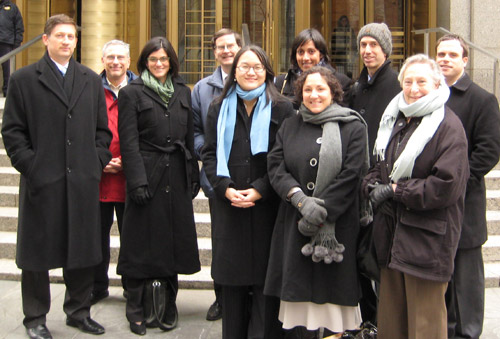
Plaintiffs, experts, and the ACLU and PUBPAT legal team outside the courthouse. Back row, from left to right: Dan Ravicher, PUBPAT; Robert Nussbaum, University of California, San Francisco; Tania Simoncelli, ACLU; Chris Hansen, ACLU; Sabrina Hassan, PUBPAT; Aden Fine, ACLU; Chris Mason, Cornell. Front row, from left to right: Sandra Park, ACLU; Lenora Lapidus, ACLU; Elsa Reich, NYU
The courtroom was packed for yesterday's hearing in the breast cancer gene patents case, a testament to the significance of our challenge. Both sides argued that the judge should rule in their favor without a trial. (You can read our motion for summary judgment here.)
The lawsuit, Association for Molecular Pathology, et al. v. U.S. Patent and Trademark Office, et al., challenges the government's granting of and Myriad Genetics' control of patents on the BRCA1 and BRCA2 human genes, which are associated with breast and ovarian cancer.
Basically what was at issue in this hearing, and what is at the legal core of the case, is whether the challenged patent claims cover "products of nature" and "laws of nature" and are therefore invalid.
There are actually many things that everyone involved in this case agrees on. Everyone agrees that researchers are free to patent new drugs, new therapeutic methods, devices, or specific DNA sequencing methods. Everyone agrees that patent law prohibits the patenting of natural phenomena and laws of nature, as these are not human inventions and no person should be able to own exclusive rights to something that occurs in nature.
Everyone also agrees that DNA in the body is a product of nature and therefore not patentable. But the defendants claim that the "isolation" of the BRCA genes — or the separation of the gene from the rest of the DNA— that is necessary to test and study them somehow makes them patentable. Chris Hansen and Sandra Park, arguing for our side, refuted this claim, explaining that isolating a gene, no matter how difficult and ingenious, does not alter the structure of the DNA itself, and so what has been patented is indeed a product of nature. Chris made an elegant point:
"Isolated DNA" must not be markedly different from DNA in the body because when a woman sends a blood sample to Myriad to find out if she has a mutation that puts her at increased risk for cancer, Myriad gives her results about the DNA in her body; they don't say, "We found a mutation in the DNA we isolated from your blood, but that's different from the DNA in your body, so we don't know what it means for your risk for cancer."
The plaintiffs also contend that Myriad's patent claims over the correlations between mutations and cancer are invalid because mutations are created by nature and the fact that some mutations lead to cancer is a phenomenon of nature. As Chris put it:
Uncovering a law of nature — while deserving of praise for the time, ingenuity, and hard work that it takes — is not patentable. Einstein certainly deserved praise and awards for discovering E = mc2, but he could not patent it.
In addition to the patent law arguments, and the reason the ACLU is involved in this case, are the First Amendment and constitutional arguments. The attorneys argued that by granting patents on the genes themselves, the government has given Myriad exclusive control of all knowledge about the gene, a clear violation of First Amendment freedoms. And unlike other patentable subject matter, such as a carburetor, where someone else can invent an alternative, other researchers cannot "invent around" a gene that has been patented. So, contrary to the purpose of the patent system as set out in Article I of the Constitution, gene patents do not "promote the progress of science and useful arts," but rather hinder research, clinical testing, and development of new tests.
Chris refuted Myriad's claim that patents were a necessary incentive for researchers to discover the BRCA genes and develop commercial testing, pointing out that there were researchers and clinicians doing BRCA testing before the patents were granted; Myriad shut them down once it got the patents. Today there are thousands of researchers and clinicians who have the ability to conduct BRCA testing and provide results to women, but are prohibited from doing so by the patents. Sandra highlighted the human impact of gene patents, calling attention to the six individual women plaintiffs in this case who have been pre-empted from knowing about their own genetics by Myriad's patents.
(If you're interested in reading our legal arguments in more detail, including a review of relevant patent case law that Sandra outlined in the hearing, take a look at our motion for summary judgment.)
At the end of more than two hours of oral argument, Judge Robert Sweet complimented all of the attorneys on their clear and skillful arguments. He highlighted that this case is of great concern to the scientific community, the biotechnology industry, people concerned with the very serious issue of breast cancer (and pointed out that probably everyone in the room has been touched by it through someone they know), and those who provide care, analysis, and diagnosis to breast cancer survivors. He acknowledged the sharp difference of opinion expressed in the arguments, and thanked the plaintiffs for bringing this fascinating and complex issue to him.
We expect a ruling sometime in the next few months. Stay tuned, and if you haven't already, be sure to watch a video of our plaintiffs and sign a message of support for them at www.aclu.org/brca.


